Last edited:

A Glass of Fine Whine -- A [CK-DV] Lombardy Learning AAR
- Thread starter Landwalker
- Start date
-
We have updated our Community Code of Conduct. Please read through the new rules for the forum that are an integral part of Paradox Interactive’s User Agreement.
You are using an out of date browser. It may not display this or other websites correctly.
You should upgrade or use an alternative browser.
You should upgrade or use an alternative browser.
Introduction
Having recently returned to Crusader Kings after a rather long hiatus, I have come to be reminded just how difficult it is to learn this game. Between the atrocious documentation and opaque game mechanics, the learning curve can be dauntingly steep at best for newcomers. With that considerable trouble in mind, I thought back to my EUIII “learning AAR” as Denmark and how successful that endeavor had been at helping me learn exactly how to play that game (and, hopefully, its success at providing new players with a window into the learning process as well), I have decided to undertake the same enterprise with Crusader Kings. Although I have at least gotten to the point where I am capable of achieving some modicum of success (taking the Duchy of Mazovia and, within about 60 years, turning those three provinces into twenty-four provinces, forming the Kingdom of Livonia, and getting well on my way to acquiring enough land to also form the Kingdom of Lithuania) I have found that I frequently run up against the same problems in CK that I did in my early days of EUIII – overly-rapid expansion making me rather unpopular amongst my fellow rulers and soon falling prey to a veritable onslaught of invasions (like having Denmark, England, and Poland all simultaneously declare war on me, or being the target for half a dozen neighboring pagan states at the same time).
Thus, this AAR has a few specific goals to help me chronicle my experience and to help me (and hopefully any readers who are new to the Crusader Kings community) gain a better understanding of just how to approach this beast:
(1) To play on Normal difficulty, in order to ensure that there are no “crutches” that might be found on lower difficulty levels that obscure some of the key facets of the game. I will be getting no artificial help, but I also will not be suffering any artificial handicaps. The AI Aggressiveness is set to Weakling (level 2 out of 5), as I have read elsewhere that higher AI aggressiveness tends to turn into absurdity. On top of that, this AAR is not about aggressiveness.
(2) To enshrine this effort in a learning-oriented AAR (this one), in order to record my progress and decision-making processes. I hope to also glean plenty of advice, suggestions, and general information from the disgustingly-knowledgeable community on these boards, both to help guarantee that my decision-making is appropriate within the context of the game’s less-than-obvious mechanics, and to make sure that I and other CK neophytes understand why certain things happen (and why we should do certain other things to counter them).
(3) To play this game to its conclusion, be that extermination (hopefully not, as that wouldn’t be a very uplifting lesson) or glory (I prefer this one).
A related note: Due to the nature of this AAR, it will not be particularly narrativist aside from my proclivity for the occasional snide comments about the characters in my game. It will be quite “gamist”, but I hope that that will not cause it to be the same as poorly-written or uninteresting. If you are looking for a good story, I highly recommend General_BT’s outrageously good Byzantine AAR, but if you’re looking for what I hope will be a well-written, interesting, and possibly even entertaining (despite its gamist nature) treatment of the game itself, read on! Don’t forget to grab your complementary and aerodynamic rotten produce from the box on your left as you enter.
My first, and perhaps most important, decision to make as I set out on this path is, of course, the selection of the country that will be the unfortunate guinea pig for my bumbling of this little adventure/experiment. Given the nature of this AAR, I had a few criteria for the faction I would choose. I wanted a faction that was economically viable from the get-go (or that had the potential to become so relatively quickly), but not necessarily a financial powerhouse. I wanted built-in mid-to-long term goals, particularly something along the lines of “form a new kingdom”. I wanted someone who was not already a major player, as while I did not want this to be too easy, I also didn’t want it to be insurmountable for one of my profoundly limited ability. Finally, I wanted a faction that did not have an abundance of AARs already on file. From a finalist list of Barcelona, Provence, Slavonia, Mazovia, and Lombardia, I finally settled on the last of these. I play rather slowly, and hope to provide game posts in installments of 20-25 years, which shall begin following shortly. So, without further ado, I give you:
Having recently returned to Crusader Kings after a rather long hiatus, I have come to be reminded just how difficult it is to learn this game. Between the atrocious documentation and opaque game mechanics, the learning curve can be dauntingly steep at best for newcomers. With that considerable trouble in mind, I thought back to my EUIII “learning AAR” as Denmark and how successful that endeavor had been at helping me learn exactly how to play that game (and, hopefully, its success at providing new players with a window into the learning process as well), I have decided to undertake the same enterprise with Crusader Kings. Although I have at least gotten to the point where I am capable of achieving some modicum of success (taking the Duchy of Mazovia and, within about 60 years, turning those three provinces into twenty-four provinces, forming the Kingdom of Livonia, and getting well on my way to acquiring enough land to also form the Kingdom of Lithuania) I have found that I frequently run up against the same problems in CK that I did in my early days of EUIII – overly-rapid expansion making me rather unpopular amongst my fellow rulers and soon falling prey to a veritable onslaught of invasions (like having Denmark, England, and Poland all simultaneously declare war on me, or being the target for half a dozen neighboring pagan states at the same time).
Thus, this AAR has a few specific goals to help me chronicle my experience and to help me (and hopefully any readers who are new to the Crusader Kings community) gain a better understanding of just how to approach this beast:
(1) To play on Normal difficulty, in order to ensure that there are no “crutches” that might be found on lower difficulty levels that obscure some of the key facets of the game. I will be getting no artificial help, but I also will not be suffering any artificial handicaps. The AI Aggressiveness is set to Weakling (level 2 out of 5), as I have read elsewhere that higher AI aggressiveness tends to turn into absurdity. On top of that, this AAR is not about aggressiveness.
(2) To enshrine this effort in a learning-oriented AAR (this one), in order to record my progress and decision-making processes. I hope to also glean plenty of advice, suggestions, and general information from the disgustingly-knowledgeable community on these boards, both to help guarantee that my decision-making is appropriate within the context of the game’s less-than-obvious mechanics, and to make sure that I and other CK neophytes understand why certain things happen (and why we should do certain other things to counter them).
(3) To play this game to its conclusion, be that extermination (hopefully not, as that wouldn’t be a very uplifting lesson) or glory (I prefer this one).
A related note: Due to the nature of this AAR, it will not be particularly narrativist aside from my proclivity for the occasional snide comments about the characters in my game. It will be quite “gamist”, but I hope that that will not cause it to be the same as poorly-written or uninteresting. If you are looking for a good story, I highly recommend General_BT’s outrageously good Byzantine AAR, but if you’re looking for what I hope will be a well-written, interesting, and possibly even entertaining (despite its gamist nature) treatment of the game itself, read on! Don’t forget to grab your complementary and aerodynamic rotten produce from the box on your left as you enter.
My first, and perhaps most important, decision to make as I set out on this path is, of course, the selection of the country that will be the unfortunate guinea pig for my bumbling of this little adventure/experiment. Given the nature of this AAR, I had a few criteria for the faction I would choose. I wanted a faction that was economically viable from the get-go (or that had the potential to become so relatively quickly), but not necessarily a financial powerhouse. I wanted built-in mid-to-long term goals, particularly something along the lines of “form a new kingdom”. I wanted someone who was not already a major player, as while I did not want this to be too easy, I also didn’t want it to be insurmountable for one of my profoundly limited ability. Finally, I wanted a faction that did not have an abundance of AARs already on file. From a finalist list of Barcelona, Provence, Slavonia, Mazovia, and Lombardia, I finally settled on the last of these. I play rather slowly, and hope to provide game posts in installments of 20-25 years, which shall begin following shortly. So, without further ado, I give you:
A 2010 Mercury Milan Hybrid Sedan

A Glass of Fine Whine – A [CK-DV] Lombardy Learning AAR


A Glass of Fine Whine – A [CK-DV] Lombardy Learning AAR

Last edited:
a comment on research:
Even though your research doesn't make a big difference in the long run, in the beginning there are a few things to research:
- siege:
CK is a game of sieges, so it is good to do it quickly. I usually research at least two levels
- mining:
level 1 mining gives you a cool building, the tile factory. For 100 ducats it makes every future building projects take 10% less time, and increases your income as well.
level 2 mining gives you the 'mine', which is one of the best buildings, it gives +1 gold per month to the province
- schools:
library is cool. For 100 gold, you get better education, an increase in the income of the province, and 25 prestige. (that doesn't seem much, but really helps). The next levels of schools give you other education boosts: monastery, schools, etc.
I would also advise to research power for the roads, but you already have that.
Even though your research doesn't make a big difference in the long run, in the beginning there are a few things to research:
- siege:
CK is a game of sieges, so it is good to do it quickly. I usually research at least two levels
- mining:
level 1 mining gives you a cool building, the tile factory. For 100 ducats it makes every future building projects take 10% less time, and increases your income as well.
level 2 mining gives you the 'mine', which is one of the best buildings, it gives +1 gold per month to the province
- schools:
library is cool. For 100 gold, you get better education, an increase in the income of the province, and 25 prestige. (that doesn't seem much, but really helps). The next levels of schools give you other education boosts: monastery, schools, etc.
I would also advise to research power for the roads, but you already have that.
This post is in response to initial feedback from Llywelyn and Galuska. Due to the initially haphazard organization of this AAR, some of those posts may no longer precede this one. You can find Llywelyn's posts below (which now include responses to this one as well). Apologies for the confusion.
I looked everywhere for screenshot hotkey information on CK and could not find it, so I assumed that there wasn't one, and that was why I ended up downloading the program that I used -- the program that wiped out so many of my screens (N.B.: Never use "Screenshot Utility").
Yeah, I knew that the organization was off to a pretty shoddy start, especially when four years of pictures vanished, but hadn't considered breaking up the first "game post" into a couple of different, smaller posts. Nor, and I have no idea why, since it is a staple of virtually every good AAR I've read, did I think about a Table of Contents. I'll go back in and edit a ToC at the top of the first post, but unfortunately I don't know how to "fix" things any better than that. I have no problem with maddeningly slow -- I'm a person who, by nature, takes an abundance of time to do just about anything. I was just more concerned about whether or not what meager few readers I might acquire would get frustrated with the sluggishness, but unfortunately in that concern, I pretty much butchered things.
I've always favored Mining, Handicraft, and Power, usually in that order, for my economic techs, specifically because of things like the tile factory, the mine and other +1 buildings, etc. So it's always nice to know that I've been doing something right.
@ Popular Law is my favorite "social law"
This isn't for sentimental reasons, but because it's another example of my "how things should work" approach to military composition: An army with no light infantry whatsoever? Sign me up! Of course, like you say, I don't have any idea whether troop composition actually matters in battle. But it ought to, and to that end, an army of pikemen, archers, heavy infantry, and light cavalry ought to be able to defeat an army of heavy cavalry and peasants. But I don't know whether or not this is actually the case.
It's also the case that since I have no idea what laws tie to which events (except for Tourney events, and only because they are specifically named as part of their respective laws), so I have no way to choosing laws based on their respective events. I used to run Feudal Contract, but I never got very many tourney events and so never really thought much of it. Since I don't have a lot of vassals right now, I'm not too concerned about the +Loyalty bonus that Feudal Contract would give them. I'm sure that I'll probably eventually get frustrated with an absence of "free claim" events (between lack of tourney events and lack of "fellow vassal insulted you in front of your liege" events, since I no longer have a liege), and I have no idea how to orchestrate any other events that might accomplish the same thing, but for now, this is what I know, meager and potentially misguided though that knowledge is.
@ Fulco and Salic Consanguinity
Not to spoil anything, but this ends up being what actually happens -- due to problems with suitability to rule, I revoke Fulco's title and instate Salic Consanguinity to prevent him from inheriting. Fortunately, as you say, I'm able to do this early, before I have a lot of vassals to piss off.
@ Peaceful Break with Germany
I know that Heinrich can still DoW my sorry Lombardian butt, but anything that keeps that from being inevitable counts as a win in my book. I know that peaceful breaks give him a claim on my territory, but so far I've been lucky in that he hasn't cared enough to come calling.
@ Tech Popups in F10 Options
I've scoured the message settings and never been able to find options for popups for either Technology discovery/spread or for Excommunication, which are my two biggest complaints about "popup absences." If you know for a fact that they're there, I will be thrilled.
Given the disaster that was the screenshot debacle and the atrocious organization that I've begun this AAR with, I'm seriously considering scrapping the game and just starting over. It would be a shame, since the game has been going pretty well so far, but it might be worth it just to make this thing tolerable.
Cheers.
I just got so mad I threw up a little in my mouth.Llywelyn said:New players should keep in mind that f11 will put a .gif image (sans cursor) in their CK folder
I looked everywhere for screenshot hotkey information on CK and could not find it, so I assumed that there wasn't one, and that was why I ended up downloading the program that I used -- the program that wiped out so many of my screens (N.B.: Never use "Screenshot Utility").
Whoops. *Sheepish*Llywelyn said:Second, organization:
It seems like the most thorough thing to do would be to have a post on each part of the game (tech, inheritance, advisors, etc.) and wait a few days for comments. That might be maddeningly slow for you, though, esp. during the early days.
The alternative is to have everything jumbled together and answers to different questions spread all through the thread.
Regardless of whether you end up with a table of content or an index, though, it's probably best you reserve the first post for it and copy/paste your current posts down one level.
Yeah, I knew that the organization was off to a pretty shoddy start, especially when four years of pictures vanished, but hadn't considered breaking up the first "game post" into a couple of different, smaller posts. Nor, and I have no idea why, since it is a staple of virtually every good AAR I've read, did I think about a Table of Contents. I'll go back in and edit a ToC at the top of the first post, but unfortunately I don't know how to "fix" things any better than that. I have no problem with maddeningly slow -- I'm a person who, by nature, takes an abundance of time to do just about anything. I was just more concerned about whether or not what meager few readers I might acquire would get frustrated with the sluggishness, but unfortunately in that concern, I pretty much butchered things.
At least I got Mining right. I was planning to switch over to Schools after I reach Aristotelian Logic, but unfortunately the Thought tech just isn't popping for me, which is starting to be very infuriating.galuska said:- siege:
CK is a game of sieges, so it is good to do it quickly. I usually research at least two levels
- mining:
level 1 mining gives you a cool building, the tile factory. For 100 ducats it makes every future building projects take 10% less time, and increases your income as well.
level 2 mining gives you the 'mine', which is one of the best buildings, it gives +1 gold per month to the province
- schools:
library is cool. For 100 gold, you get better education, an increase in the income of the province, and 25 prestige. (that doesn't seem much, but really helps). The next levels of schools give you other education boosts: monastery, schools, etc.
That's definitely good to know. The simplicity of combat was already obvious, but I've always operated on "well this is what should happen" when I choose my military techs. And because of that, I've been favoring the "equipment techs" over the siege weapons on the rationale of "I would rather my armies win the battles and have longer sieges than lose the battles and not lay siege at all". However, if the equipment techs are as trivial as you say, focusing on them is probably not going to be wildly beneficial. It'll be tough to get my mind off the track it's already on ("Blast it all, we should have superior armies!"), but I'll work on incorporating this tip into my game.Llywelyn said:Third, the combat model is very simplistic. Your thoughts are admirable, but 95 times out of 100, it seems like the larger army defeats the smaller. DV finally started taking the MIL trait more into account, but afaik the tech bonus from one or two levels of military research is utterly negligible. The only exception I've noticed might be that arrows seem to have some effect on reducing morale.
Fourth, the AI generally doesn't research siege tech and it does speed your ability to take a castle. You should research it unless you can afford to improve your castles, at which point you should research the next level of those.
I've always favored Mining, Handicraft, and Power, usually in that order, for my economic techs, specifically because of things like the tile factory, the mine and other +1 buildings, etc. So it's always nice to know that I've been doing something right.
I'm not sure I understand this. If CK works the same as EU3 does, then the higher difficulty levels penalize you on things like Reputation reduction (and in the case of CK, would presumably penalize you on things like the prestige cost of title-grabbing/-usurping) beyond what is "normal", while the lower difficulty settings would do the opposite. Of course, CK's mechanics are so bafflingly opaque that I have no way of knowing what the effects actually are -- it's just another case of "well this is what should be happening." Either way, I don't understand how not imposing what I assume to be extra penalties would qualify as a crutch.Llywelyn said:Afaik, there are no events died with difficulty — the main difference is the cost of claiming titles without waiting for events or justification. So normal difficulty already is a crutch.
@ Popular Law is my favorite "social law"
This isn't for sentimental reasons, but because it's another example of my "how things should work" approach to military composition: An army with no light infantry whatsoever? Sign me up! Of course, like you say, I don't have any idea whether troop composition actually matters in battle. But it ought to, and to that end, an army of pikemen, archers, heavy infantry, and light cavalry ought to be able to defeat an army of heavy cavalry and peasants. But I don't know whether or not this is actually the case.
It's also the case that since I have no idea what laws tie to which events (except for Tourney events, and only because they are specifically named as part of their respective laws), so I have no way to choosing laws based on their respective events. I used to run Feudal Contract, but I never got very many tourney events and so never really thought much of it. Since I don't have a lot of vassals right now, I'm not too concerned about the +Loyalty bonus that Feudal Contract would give them. I'm sure that I'll probably eventually get frustrated with an absence of "free claim" events (between lack of tourney events and lack of "fellow vassal insulted you in front of your liege" events, since I no longer have a liege), and I have no idea how to orchestrate any other events that might accomplish the same thing, but for now, this is what I know, meager and potentially misguided though that knowledge is.
I wish that were the case, but I would say that in about 90% of my games, Henry IV mops the floor and ends up with something like 12 demesne provinces. I have only seen a couple of games where Germany buckles under Henry, and on the rare occasion I do see Germany collapse, it seems to almost always be because Henry got himself killed in battle first. In any case, as of 1080, Henrician Germany is still going quite strong.In my games, Henry IV usually has a hard time of it.
@ Fulco and Salic Consanguinity
Not to spoil anything, but this ends up being what actually happens -- due to problems with suitability to rule, I revoke Fulco's title and instate Salic Consanguinity to prevent him from inheriting. Fortunately, as you say, I'm able to do this early, before I have a lot of vassals to piss off.
This is definitely useful information -- thank you! I already keep an eye on courtier loyalty, of course, but wasn't aware of how other issues impacted things. I certainly didn't know about "Friend Advisors" being able to get the ruler extra benefits. I'd heard something about "tutors having good Diplomacy" before but wasn't sure exactly how that played out, so it'll be good to keep an eye on that in the future.Worth pointing out that there are other concerns for courtiers in DV than just their raw stat. Low or falling loyalty courtiers are always a bad bet; various traits are non-starters (cowardly marshals, eg); others trump the numbers (wise courtiers are always useful); likewise the king's friends can help him out outrageously if they're in a position to do so (particularly stewards).
The pope can be pissed at infidel courtiers, and it's not worth it to defend them except for role-playing value (but then why would you have promoted them in the first place?), but you can use them til the event shows up.
The most important thing to keep in mind is that if you have children, make sure their tutor has DIP >7, which indicates they are capable teachers. For children with an ecclesiastical education, you're looking at the diocese bishop/confessor; for children with a martial education, you're looking at (surprise) the marshal; for children with a court education, you need to cover your bases and look at the spymaster, the steward, and the chamberlain.
@ Peaceful Break with Germany
I know that Heinrich can still DoW my sorry Lombardian butt, but anything that keeps that from being inevitable counts as a win in my book. I know that peaceful breaks give him a claim on my territory, but so far I've been lucky in that he hasn't cared enough to come calling.
@ Tech Popups in F10 Options
I've scoured the message settings and never been able to find options for popups for either Technology discovery/spread or for Excommunication, which are my two biggest complaints about "popup absences." If you know for a fact that they're there, I will be thrilled.
I've started to notice that, as well. Given that, is there any reason to choose one of the non-parental-upbringing options over any of the others, if their affiliated trait will just disappear?@I hand him off to the nannies for that +1 Stewardship from Selfish.
I always used to do this for my daughters as well, but that selfish trait is just a placeholder. It disappears as soon as his personality develops.
Why is that? I'd never heard anything about that before.@I consider disbanding one of my two regiments
Better to do this inside your realm's borders than outside, if you're going to.
Given the disaster that was the screenshot debacle and the atrocious organization that I've begun this AAR with, I'm seriously considering scrapping the game and just starting over. It would be a shame, since the game has been going pretty well so far, but it might be worth it just to make this thing tolerable.
Cheers.
Last edited:
Given the disaster that was the screenshot debacle and the atrocious organization that I've begun this AAR with, I'm seriously considering scrapping the game and just starting over. It would be a shame, since the game has been going pretty well so far, but it might be worth it just to make this thing tolerable.
The organization you can fix now: just copy/paste each post down one and leave the first blank. As for the screenshots, you can take some of the very beginning of the game and we're almost out of the dark ages.
Besides which, it's a learning aar, right?
I looked everywhere for screenshot hotkey information on CK and could not find it, so I assumed that there wasn't one, and that was why I ended up downloading the program that I used -- the program that wiped out so many of my screens.
Probably worth pointing out that Havard's old CK wiki was gutted by spammers and the new CK wiki still needs more love and attention, if people would like to add bits and pieces of things they know.
I'll mix in the replies to the rest of the stuff above.
Last edited:
Let's Start at the Very Beginning: Day 0 - Day 1, Family, Laws, and Technologies
First of all, let me apologize for the initial paucity of pictures that will be accompanying this AAR. The program that I was using to capture screens decided to overwrite all of the screens from the first six years of play, so unfortunately I have no images until January 1072. That program has since been scrapped, so hopefully the problem will not arise in the future. Until that date, we'll just have to cross our fingers and hope that my gripping prose will be enough to keep you interested. I apologize in advance for all of the text – a picture is worth a thousand words, and I lost about 25 pictures, so there are a lot of words here.
As you will shortly be able to tell, this will be a fairly slow-moving AAR. I don't play very quickly, and take my time to make sure I'm doing everything I want to be doing. I've currently finished playing up to 1080, and I hope to post from 1072-1080 tomorrow.
Now then.
The Duchy of Lombardia brings a few pros and cons to the table. On the plus side, it has a great long-term goal in the formation of the Kingdom of Italy. It starts with two economically-strong demesne provinces, Lombardia and Pavia. It also starts with decent laws -- Popular Law is my favorite "social law", and Elective inheritance isn't too bad for a small duchy that can easily rig the election by making sure the best family member holds the only non-demesne county.
On the down side, Duke Azzo d'Este ain't exactly a spring chicken, and he doesn't have very good stats for a starting ruler. Furthermore, the heir-designate, Fulco, the six-year-old Count of Grisons, is also nothing to write home about. Lombardia is also in the same position as many other good factions, like Flanders and Provence, in that they are vassals of Germany and, consequently, are dependent on the time and extent of Germany's collapse to really get going, which can take some time. But time is something I have in nauseating abundance.
The Starting Conditions:
The Lands of Azzo d'Este, Duke of Lombardy, and His Son Fulco d'Este, Count of Grisons, in the Year 1066
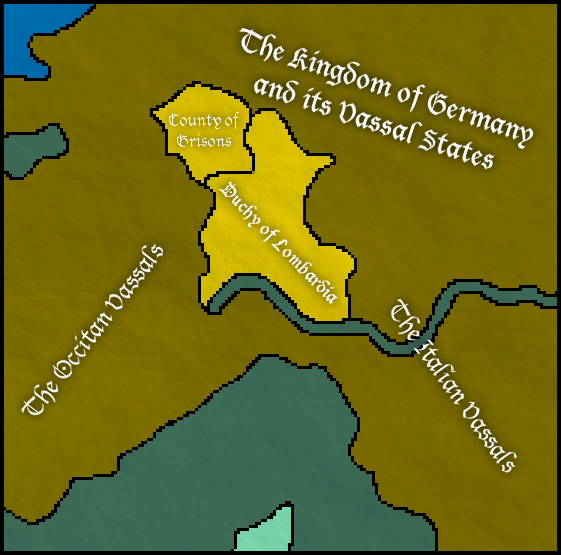
The Realm of King Heinrich von Franken, 1066
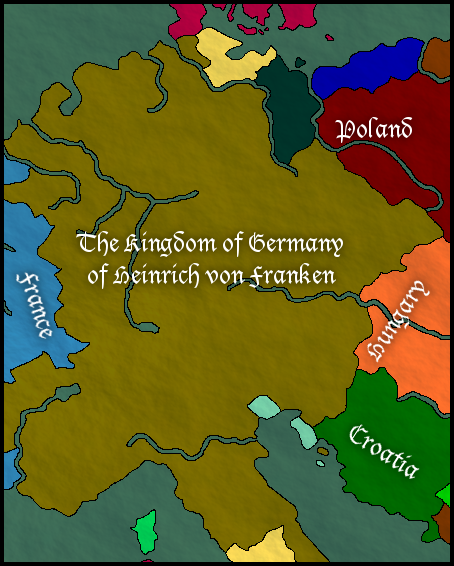

The Realm of King Heinrich von Franken, 1066

This game uses Veldmaarschalk's TASS mod, but no other changes have been made. I am starting from the earliest point, the 1066 scenario "The Confessor". The difficulty setting is Normal, and the AI Aggressiveness is Weakling.
“It’s amazing how a family can be torn apart by something as simple as a pack of hungry wolves.”
Jack Handy, Deep Thoughts
We begin this comedy of errors on January 5, 1066, at the northern end of Italy, in the southernmost reaches of the empire of Heinrich von Franken, King of Germany. Although not yet of age, Heinrich's stats put those of my ruler and heir to shame. That shamed ruler with whom I embark on this adventure is Duke Azzo d'Este, a man far past his prime and with terrible Stewardship. Given his age (59 at the start of the game), however, I'm hopeful that he won't last very long and will pass control on to a competent heir. Whether or not that heir will be Fulco remains to be seen.
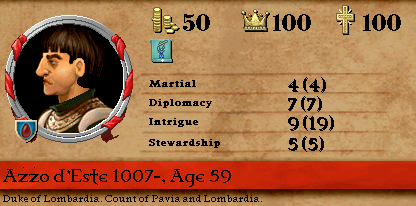
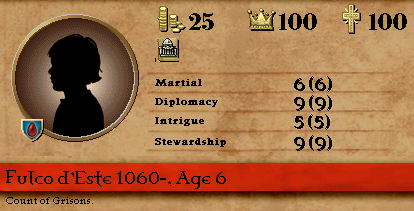
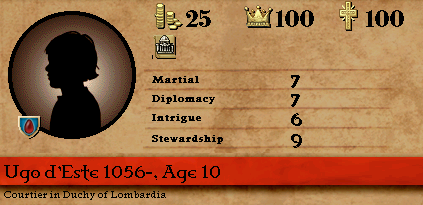
Fulco d'Este is the duke's youngest son. His eldest, the comically-named Guelph Welf, marks his lineage from the mother's side and is not part of my dynasty. Guelph Welf spends his time as military marshal in the Duchy of Bavaria and is of essentially no concern whatsoever to me. The middle son, Ugo, is of little interest at the moment -- he is underage and is not in a position to inherit, as Fulco supersedes him by virtue of ruling the County of Grisons. Fulco's position as count is frustrating, because it means that he is outside my control or supervision while he matures, but there's nothing I can really do about this unless I start my game revoking titles, and that's not yet on the agenda. Fulco is also problematic because his intrigue is quite poor, but his other attributes are tolerable, so I cross my fingers and hope he can grow up competently.
“For every human problem there is a neat, simple solution; and it is always wrong.”
H.L. Mencken—Mencken’s Metalaw
Having taken stock of my family, I turn to the laws of the duchy. Lombardy begins under Elective Law inheritance, which is good for a duchy of my size and composition -- it is easy to control who inherits by dumping a county on them. Grisons is too poor (base income 0.60) to be worth holding as a demesne province and thus makes an excellent "staging ground" for the family heir, and this allows me to make sure that whoever inherits will be the best-qualified. I will probably change this law to Salic Consanguinity at some point, but for now there is no need.
Lombardy's social law is "Popular Law", which I love. You're low on knights (usually without them altogether), but you also have zero light infantry in your armies. I usually see Popular Law armies that are 30% Light Cavalry, 30% Archers, 20% Heavy Infantry, and 20% Pikemen, which isn't a bad distribution at all. Occasionally, and for reasons I don't understand, a province will field 10% Knights and 20% Archers instead, but that's nothing to complain about. Popular Law will be staying.
Church Supremacy, unfortunately, is worthless. You receive neither gold nor soldiers, and there is essentially no benefit (as far as I can tell, and readers are welcome to correct me) to having this Religious law. Consequently, my first decision in this game is to change this law. I decide to go with Monastic Supremacy. Clerical power in the provinces will give me more gold, and I need all the money I can get right now in order to start developing my provinces. I might switch this to Ecclesiastical Balance later to get a few extra troops, but right now I need cash.
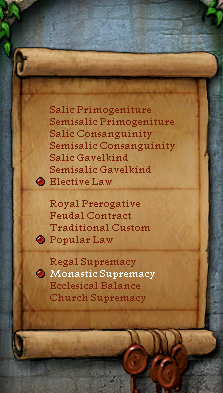
"If the automobile had followed the same development cycle as the computer, a Rolls-Royce would today cost $100, get a million miles per gallon, and explode once a year, killing everyone inside."
Robert X. Cringely, InfoWorld magazine
Leaving the Laws sidebar, I move on to Technologies. Lombardy starts out knowing Slinged Javelin (Crossbows), Chained Leather (Chain Armor), Shortsword (Slashing Weapons), Hill Fort (Castles), and Basilican and Brickwork Structures (Architecture). I decide to put my research focus on Crushing Weapons (in order to benefit my armies' focus on light cavalry and heavy infantry), mining (in order to enable tile factories for bonuses to gold and build time), and Aristotelian Logic. I don't actually know what the Thought technologies do, but it seems like they should improve my research, and that's something I'm in favor of.
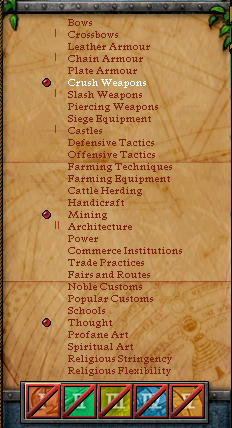
Now I turn to the provinces themselves. Azzo's demesne consists of Lombardia and Pavia, two good economic provinces (base income of 4.80 and 3.60 respectively), but two undeveloped provinces. Between the two of them they have only two hill forts and one church (in Lombardia). Since Azzo only starts with 50 gold, though, I can't build anything yet.
Finally, Azzo, despite pushing 60, is in the market for a bride. First, however, I wait a day in order for all of the courts to "populate", so that I can see what I need to address.
"A man in love is incomplete until he is married. Then he is finished."
Zsa Zsa Gabor
January 6, 1066: My court receives its members, but they are, like the duke himself, nothing to be especially proud of. Stewardship proves to be the most pressing concern, so I get Azzo out on the prowl. Despite my low expectations for Azzo's longevity, I would like a good steward who will be around for a while even after he kicks the bucket. A quick consultation of the ledger leads me to Matilde Steno, a courtier at Venice. Not only does she have an impressive 14 Stewardship, but she also shares my ruler's culture (Italian, of course). A request quickly goes out.
Due to Azzo's low loyalty to his liege, King Heinrich (48.1%), he has the ability to form alliances of his own. Since I obviously want to be free of Germany overlordship -- preferably before Heinrich has the opportunity to create the Kingdom of Italy, so that my provinces won't count towards his total -- I would like some muscle on my side should push come to shove. With this in mind, I send an offer of alliance to Philippe, King of France.
Thus concludes my first day as Duke of Lombardy. Now, after all of that, I'm finally able to hit Go for real. As my tiny duchy waddles forth on its wobbly legs, I take a moment to consider my goals as they currently stand.
Last edited:
Setting Goals
In the short term, I want to improve my provinces and ensure financial stability; to try to make sure (as much as I am able) that Fulco doesn't end up as a worthless leader; and to avoid getting destroyed or irreversibly bankrupted in Germany's inevitable wars.
In the middle-term, I want to expand my territory and add additional profitable provinces, prioritizing Genoa, Piemonte, Brescia, and Cremona, if they become available -- Brescia and Cremona will round out the provinces tagged to the Duchy of Lombardy, and I am a bit OCD about things like that -- but anywhere with good income will do; to add more ducal titles as they become available; to peacefully break with Germany if possible to avoid obliteration, although if Germany really blows up, peaceful independent will be less imperative, but either way, I'm looking for sooner rather than later; and to avoid getting destroyed or irreversibly bankrupted.
In the long term, I want to form the Kingdom of Italy; and to avoid getting destroyed or irreversibly bankrupted.
The First Uncertain Steps: 1066-1071
Meanwhile, Lombardy trudges onwards. Philippe predictably rejects my offer of alliance, so I'll have to shop elsewhere. I try Poland, Hungary, and Bohemia, but they all shoot me down. Nobody loves Lombardy. Meanwhile, on January 25, I receive a few offers of alliance, from such powerhouses as Corsica and Forez. I show them the door. Lombardy has loftier aspirations, and they don't bring anything noteworthy to the table.
A day later, Venice finally accepts my marriage proposal. I obviously take the offered duty and receive 85 gold, which allows me to begin construction on a Forestry in Lombardia (Forestry gets priority because of the gold increase and build time decrease). With Azzo's new wife as steward, I now have a monthly income of 12.42, not bad for a faction of my low standing, as opposed to 7.10 under the old steward (whose stewardship was half that of Matilde's). I love high stewardship.
In March, Lombardia discovers the Handaxe (the first level of Crushing Weapons). If all of my advances are so rapid, I will be a happy ruler. On the other hand, I hate the lack of pop-ups for techs. That dinky little noise is far from sufficient notice. I switch my military focus to Leather Armor, in order to get a bit of defensive bonus for everyone.
“If you want to know what God thinks of money, just look at the people he gave it to.”
Dorothy Parker
In April, I finally realize that I am running at greater than 50% Church Donations. That's what I get for not checking my treasury bar at the outset. Since all of my provinces have 100% loyalty from the clergy, I don't need to be running at anything over 50%, so I correct that oversight immediately. I don't need the piety bonus for higher donations right now, anyway. This reduction nets me a whopping +0.45 gold per month. By July, I have enough money to start a Forestry in Pavia (again for the money and build speed).
On September 4, I get the "How to Raise Ugo" (your non-inheriting son) event. Much as I would love to give him Parental Upbringing and flex my fatherly muscle by putting him on track for the ducal seat, Fulco's count title bumps Ugo down in the line. So, rather than splurge on Parental Upbringing for Ugo, I hand him off to the nannies for that +1 Stewardship from Selfish. As a non-inheritor, I figure that Ugo's prestige and piety aren't terribly important.
Within a month, Ugo forms a strong bond with his mentor, Chancellor Ennio Papareschi. I don't really know what the benefit would be from a friendship between Ugo and Ennio, so I go with "Handle on my own" -- there's only a 25% chance of something bad happening (Stressed), and a 75% chance of a neutral or good outcome. Naturally, I get no effect (50%).
In January 1067, Lombardia completes its forestry. I don't have any money for more buildings right now, so I decide to wait until I have 150 gold for a Training Ground. By June, I have the necessary funds, and the construction is under way. I figure that any bonus to recruitment speed will guarantee I'll be in the best shape possible when push comes to sword thrust.
At the end of April, my spymaster dies. Unfortunately, the best replacement only has Intrigue 7.
In July, after Pavia's forestry completes, I look over at the Byzantine Empire to see how it's faring in its inevitable problems. There aren't more than one or two rebelling princes, but Michael Dukas already has Realm Duress and a lot of his Anatolian vassals are already low on loyalty and falling, so that'll be fun to keep tabs on when they start bottoming out. The European princes are more loyal, but there are still a few predictable malcontents (Viden, Preslav, and Durazzo). In fact, by December, Michael Dukas has already been killed in battle, and Alexios Komnenos sits on the Byzantine throne. Alexios also has Realm Duress, and the empire is falling apart fast: Vidin, Preslav, Samos, Opsikon, Armenia Minor, Chaldea, Cherson, Cibyrrhaeot, and the Archipelago are all now in open rebellion. Sadly, the wonderful screenshot of this civil disaster is lost.
In August one of my worthless courtiers dies. This otherwise irrelevant event is made better by the arrival of a replacement courtier to fill out my court, who has 11 Intrigue and promptly becomes my new spymaster.
In March of 1068 (four more years until pictures), non-inheriting-son Ugo becomes a mischievous blackguard, gaining Energetic and Cruel while losing Selfish. There are much worse traits one could gain, although Cruel doesn't make him especially likable. But remember, he's not inheriting, so I don't really care (and this becomes somewhat important later).
May rolls around, the training grounds in Lombardia are completed, and I have enough money to build another one in Pavia.
“Politics is the art of looking for trouble, finding it whether it exists or not, diagnosing it incorrectly, and applying the wrong remedy.”
Ernest Benn
A couple of months later, I receive the Dissenting Culture event. I decide on the "Subvert the realm together" option -- after all, I'm looking for a way out of vassalage. I gain a friend in Cadalous of Roma, the Prince-Bishop of Parma. Despite both of us being rebellious, we are also both still gaining loyalty each month. Of course, Azzo will die soon anyway (so I think -- he's now 61 years old) and I can just choose not to have Fulco swear fealty.
As the year closes, Mathilda di Canossa, duchess of Toscana, declares independence from Germany. Peacefully, for the first time I ever remember. On the plus side, this means Heinrich won't be demesne-annexing her territory and establishing an infuriatingly strong presence in Italy. It also means that Heinrich now only controls a total of 17 Italian provinces, short of the 21 (out of 31) necessary to create the title of King of Italy, so I won't have to worry about usurping it. I also don't have to rush my independence, because I don't have to worry about preventing Heinrich from forming Italy. On the downside, even if Germany does collapse, Tuscany will now still be a major regional player that I'll have to deal with.
On April 16, I get the Time to End Vassalage event. Heinrich recently cranked up my liege duty, so it's about time. Obviously, I go with the peaceful option to avoid getting totally annihilated. The first thing I do is offer an alliance to Tuscany and France. The first thing Tuscany and France do is reject me.
In October, Road Building has spread to Pavia, and I have the money, so I start a road network. I also realize, quite accidentally, that my rebellious friend Bishop Cadalous of Parma has been excommunicated! I promptly grab his title on the cheap (26 prestige). Even more than with technologies, I hate that excommunications don't get announced, because their impact on title claims has a huge effect on the game.
In December, Parma makes the mistake of peacefully breaking from Germany, then makes another mistake by announcing this via an alliance request to me. I do a quick comparison of militaries and have about a 2.5:1 advantage, so I decide that now is an excellent time to start expanding to a good province and declare war on my friend. The forces are marshaled in Lombardia and start marching.
1070, two years until I can start providing you with gruesome images. 63-year-old Azzo is marching to war, but the war's expense is telling. I'm losing 28 gold with only half of my forces marshaled, so I am going to be very bankrupt, very soon. Grisons can only contribute 224 soldiers, so there's no point in bringing them up. On January 14, the Lombardia regiment reaches Pavia, so I marshal the rest of the army and head for Parma. At the end of the month, the longspear spreads to Lombardia.
February marks the deciding clash with the forces of Parma. Marshal Pietro di Baggio gains +1 Martial, which is always nice, giving him a total of all of nine. After my victory (lose 282 to their 880), I send the whole army to Parma for the siege. I consider disbanding one of my two regiments in order to save some money, but I figure I'll be better served by a more rapid conclusion of the siege. Mid-battle, Corsica offers me an alliance again. Nobody else wants to be my friend, and I might be able to vassalize them later, so I go ahead and accept. Parma offers me peace and their whole treasury, but I'm after land, so they are shown the door.
"So long as governments set the example of killing their enemies, private citizens will occasionally kill theirs."
Elbert Hubbard
In May, I get the "State of War reduces your stability" event. I can't afford to lose another 289 gold, so I eat the -1 Stability. Bah. Three days later, the siege at Parma is completed, I annex the province, and I'm only at -205 gold. And -1 Stability.
In 1071 (one more year until pictures), Savoie rebels, which means Heinrich will be annexing them to his demesne. No Piemonte for me anytime soon.
Since Azzo is so old (64 and still kickin’), I start looking for good claims I can afford to grab before he kicks the bucket, figuring I may as well do something useful with his prestige. I decide to grab Montferrato – combined with the acquisition of Parma, Montferrato will allow me to usurp the title of Duke of Genoa. Montferrato is also allied with Savoie (but not at war with Germany), so once Heinrich’s armies show up there won’t be anyone to come to their aid. My plan at the moment, having grabbed the title, is for Azzo to die of old age, Fulco to inherit, declare war on Montferrato, then use the prestige from that victory to usurp Doge of Genoa or grab Magistrate of Genoa.
By June, I’m finally out of debt. In September, I get the “Hunting Event”, with Montferrato of all people. I decide on Glory is Mine, since I’m basically trying to kill Azzo at this point and don’t care about relations with the county. Azzo naturally survives with no ill effects. By November, Heinrich has engaged Savoie, so I have to move against Montferrato now before Savoie is eliminated and they find a more powerful ally. Finally out of debt, I also start a forestry in Parma.
Within a month, Montferrato surrenders with the siege barely even under way, offering their title and treasury, so I accept, grateful to be saving money on troop upkeep. I am now at Tarnished Reputation, and my “cunning plan” was undone by Azzo’s refusal to die, so it’s time to lay low for a while and avoid antagonizing anyone who has claims on me. Thanks to my independence, that includes Heinrich, and the last thing I want to do is anything that could prompt him to declare war on me and end this campaign prematurely.
Since this is quite long enough already, I’ll go ahead and wrap up this first post. Tune in next time…
… does Fulco inherit the duchy?
… does Heinrich vaporize Lombardia, or does the German kingdom begin to crack?
… does Alexios ever reestablish order in Byzantium?
… does Azzo d’Este ever die?
… also, pictures! And to prove that they do actually exist:

Phew, there. I think that I've gotten things into the ballpark of presentable. The fact that the initial comments are out of order with the game posts will be a bit jarring, but aside from that I think things are now tolerable. I'll work on getting a couple of start-condition images up and that should take care of things.
Thanks for your patience.
Cheers.
Thanks for your patience.
Cheers.
First, welcome & thanks for starting a project like this 
Second, organization:
It seems like the most thorough thing to do would be to have a post on each part of the game (tech, inheritance, advisors, etc.) and wait a few days for comments. That might be maddeningly slow for you, though, esp. during the early days.
The alternative is to have everything jumbled together and answers to different questions spread all through the thread.
Regardless of whether you end up with a table of content or an index, though, it's probably best you reserve the first post for it and copy/paste your current posts down one level.
Third, difficulty:
Afaik, there are no events died with difficulty — the main difference is the cost of claiming titles without waiting for events or justification. So normal difficulty already is a crutch.
>I'm not sure I understand this. If CK works the same as EU3 does, then the higher difficulty levels penalize you.
Right.
>I don't understand how not imposing what I assume to be extra penalties would qualify as a crutch.
Because the most essential thing to realize about CK is that, once you get the basics down, it is really easy. If you're really playing for keeps, the only difference between the lawspeaker of the Faroe Islands and the king of France is one marriage and two or three assassinations.
You are right to point out that difficulty affects badboy reduction (tied with piety), but for the most part that reduction is so minute that you're much better off force-yielding a title to a Sicilian infidel than waiting for the clock to run out.
Fourth, aggressiveness:
You see players like Veld suggest that high aggression hurts the AI — probably lower aggression does help very weak powers like Nubia, somewhat. Low aggression is very important, however, if you want your map of Europe to look at all regular or to have well-formed states to compete with once you become a major power yourself.
Fifth, pics:
Yeah, that sucks — tl;dr can always be a problem with a new AAR. Glad to hear it'll get better, although this way makes talking about the early years a little more difficult. Some of the pictures, like the map situation, you can go ahead and include: just start a new game, take some shots, and close out.
New players should keep in mind that f11 will put a .gif image (sans cursor) in their CK folder (the same one with the game file). You can also use prnt scrn, which keeps the cursor but requires tabbing out of the game to paste the image into a graphics editor like photoshop. I hear some people use and enjoy FRAPS, although /b/ has probably ruined that for me.
Second, organization:
It seems like the most thorough thing to do would be to have a post on each part of the game (tech, inheritance, advisors, etc.) and wait a few days for comments. That might be maddeningly slow for you, though, esp. during the early days.
The alternative is to have everything jumbled together and answers to different questions spread all through the thread.
Regardless of whether you end up with a table of content or an index, though, it's probably best you reserve the first post for it and copy/paste your current posts down one level.
Third, difficulty:
Afaik, there are no events died with difficulty — the main difference is the cost of claiming titles without waiting for events or justification. So normal difficulty already is a crutch.
>I'm not sure I understand this. If CK works the same as EU3 does, then the higher difficulty levels penalize you.
Right.
>I don't understand how not imposing what I assume to be extra penalties would qualify as a crutch.
Because the most essential thing to realize about CK is that, once you get the basics down, it is really easy. If you're really playing for keeps, the only difference between the lawspeaker of the Faroe Islands and the king of France is one marriage and two or three assassinations.
You are right to point out that difficulty affects badboy reduction (tied with piety), but for the most part that reduction is so minute that you're much better off force-yielding a title to a Sicilian infidel than waiting for the clock to run out.
Fourth, aggressiveness:
You see players like Veld suggest that high aggression hurts the AI — probably lower aggression does help very weak powers like Nubia, somewhat. Low aggression is very important, however, if you want your map of Europe to look at all regular or to have well-formed states to compete with once you become a major power yourself.
Fifth, pics:
Yeah, that sucks — tl;dr can always be a problem with a new AAR. Glad to hear it'll get better, although this way makes talking about the early years a little more difficult. Some of the pictures, like the map situation, you can go ahead and include: just start a new game, take some shots, and close out.
New players should keep in mind that f11 will put a .gif image (sans cursor) in their CK folder (the same one with the game file). You can also use prnt scrn, which keeps the cursor but requires tabbing out of the game to paste the image into a graphics editor like photoshop. I hear some people use and enjoy FRAPS, although /b/ has probably ruined that for me.
For sentimental reasons? Feudal is so much more helpful that it's highly advised for new players, although it's almost a crutch to itself: it gives a bonus to your vassals' loyalty, it tends to quickly give you the 'just' trait via event, it avoids various nasty events where your vassals demand it.@Popular Law is my favorite "social law"
Royal prerog and feudal both have tourney events which can give you claims on neighbors' lands for free. Also, afaik, royal prerog and feudal also create armies heavier on the knights and hard-hitters, although I've never seen a systematic treatment about whether unit composition really matters in battle.
Amen.@Elective inheritance isn't too bad [if you] can easily rig the election
The loyalty bonus is nice, more indy states will tend to bevassalize themselves to you, and it's fun for the tension. The problem, of course, is that you are completely exposed during the period before you have children and while they are growing, unless you want your brother and his children inheriting; the alternative is to give up the ability to train and marry your son yourself by giving him a fief at age 0.
In my games, Henry IV usually has a hard time of it.@and, consequently, are dependent on the time and extent of Germany's collapse to really get going
>[But] I would say that in about 90% of my games, Henry IV mops the floor and ends up with something like 12 demesne provinces.
Well, sure, but he had to work for them. More to the point, he was so busy battling the openly rebellious vassals you and the other meekly rebellious ones were able to slip out unmolested. Also, you're a newby Imperialist and probably didn't move heaven and earth to become PC [papal controller] specifically to excommunicate the sod. [Although, an amusing cautionary tale can be found here.]
>I honestly have never understood, or even begun to understand, the mechanics behind becoming Papal Controller. =\
Pretty easy. If the pope has a blood relative, he's usually the PC. That mostly matters if you have a family member with enough piety you think you can get him elected to the position; most popes are from generated dynasties. To control them, you just need to be the guy with the highest piety in Christendom. Crusading helps, establishing bishoprics is the usual path.
If some other guy is already PC but you surpass him in piety, you can kill him off, but it's much easier to just save and reload. Upon reload, you're the new PC. To give your pope more prestige to play with, try to marry as many courtiers as you can to members of the Roman court. Also, if he's got good advisors, consider fostering your kids in his court or his successors, so you get friendly.
Worth pointing out (a) that the game is only concerned with patrilineal dynasties and (b) that you can still get around it by saving the game and reloading as the new dynast. This is especially important if you want to have female rulers, a la Drakenfire's mod.@Guelph Welf, marks his lineage from the mother's side and is not part of my dynasty.
Why not? The beginning is the best time for it. You lose bb over time (based on your piety) and it's much better to get him into your house. You can control his education and marriage, and unless you've already hit your demesne limit, you'll get more income.@game revoking titles, and that's not yet on the agenda
If he refuses the first time, he's family — wait a few months for his loyalty to hit 100 again and try again. Repeat.
If you are going to do this later, do it now: you have fewer vassals to piss off. With DV, children's stats [other than health and fertility] are not generally tied to their parents, so its less important to make sure that your earliest rulers are all ubermenschen.@I will probably change this law to Salic Consanguinity
Two things: (a) You make the clerics happy (but this is because you're forced to give more cash to the church; might as well just do that on your own if you are so inclined.) (b) It avoids certain investiture events where you have to switch to church supremacy or be excommunicated (but again you can switch back later.)@Church Supremacy, unfortunately, is worthless.
Edit: Oh, right. Occasionally, if you already have moneylenders, you can shut them down for the Pope in exchange for free piety.
@Research
First, they're not all that important.
Second, if you're thinking about spending time researching a tech on your own, you should check the map to make sure your neighbors don't already have it (meaning it will spread into your province on its own fairly quickly.)
Third, the combat model is very simplistic. Your thoughts are admirable, but 95 times out of 100, it seems like the larger army defeats the smaller. DV finally started taking the MIL trait more into account, but afaik the tech bonus from one or two levels of military research is utterly negligible. The only exception I've noticed might be that arrows seem to have some effect on reducing morale.
Fourth, the AI generally doesn't research siege tech and it does speed your ability to take a castle. You should research it unless you can afford to improve your castles, at which point you should research the next level of those.
Fifth, handicraft, mining, and power are the best economic techs. Unless you're based out of Constantinople, the +1• buildings are much more valuable than the +% ones. Power is important because you need to have roads connecting your provinces if you want things like cultural spread.
Sixth, yeah, I don't know that thought techs have been shown to speed tech, but that is what they should do. I alternate picking them up with the school techs (they improve your children's education — if you can't afford them, consider fostering) with the various cultural techs. They're essential to upping your tax rates without pissing off your people.
Last edited:
Could've done this before unpausing to allow your court to fill up. The main reason other powers reject alliance offers is that they've already signed someone else up. For the most part, they'll never agree to an alliance until their current ally meets with some kind of an accident.@he has the ability to form alliances of his own.
Worth pointing out that there are other concerns for courtiers in DV than just their raw stat. Low or falling loyalty courtiers are always a bad bet; various traits are non-starters (cowardly marshals, eg); others trump the numbers (wise courtiers are always useful); likewise the king's friends can help him out outrageously if they're in a position to do so (particularly stewards).@My court receives its members
The pope can be pissed at infidel courtiers, and it's not worth it to defend them except for role-playing value (but then why would you have promoted them in the first place?), but you can use them til the event shows up.
The most important thing to keep in mind is that if you have children, make sure their tutor has DIP >7, which indicates they are capable teachers. For children with an ecclesiastical education, you're looking at the diocese bishop/confessor; for children with a martial education, you're looking at (surprise) the marshal; for children with a court education, you need to cover your bases and look at the spymaster, the steward, and the chamberlain.
>I'd heard something about "tutors having good Diplomacy" before but wasn't sure exactly how that played out
Yeah, but really high DIP isn't necessary either, afaik - you just need at least 7. There's a run-down in the CK FAQ someplace.
Not especially important except for role-playing purposes and keeping your children in line.@she also shares my ruler's culture (Italian, of course)
It's not really possible. It's worse if you border the Emperor's demesne, but if the Emperor is in a stable position and you use the rebelliousness-inspired 'declare independence peaceably' event, he can still DOW your sorry vassal @ss.@to peacefully break with Germany if possible
It might not be available, but can't you edit this under the f10 options screen?@I hate the lack of pop-ups for techs.
I always used to do this for my daughters as well, but that selfish trait is just a placeholder. It disappears as soon as his personality develops.@I hand him off to the nannies for that +1 Stewardship from Selfish.
>Given that, is there any reason to choose one of the non-parental-upbringing options over any of the others?
Sure. They are placeholders for the personality events. If you want your kid to be a studious bookworm or martyr, send her to church. If you want your kid to be a mischievious little brat, the nannies. A hellraiser, the lords. Although I don't think anyone's done a chart to compare all the outcomes, you could scroll through the event files if you were deeply curious.
If he comes to power, it's good to have friends as your advisors. Afaik, it doesn't make him a better pupil.@Ugo forms a strong bond with his mentor
Sometimes it's precisely better to give your valuable army-heavy provinces to a vassal, so you don't have to pay for the army. Needless to say, you still have to be somewhat cautious when you do.@I am going to be very bankrupt, very soon.
Also, of course, the ridiculous way the game treats debt makes this unnecessary most of the time: you don't pay interest, you occasionally have to rebuild a fort, you can't hire assassins, and that's pretty much it.
Better to do this inside your realm's borders than outside, if you're going to.@I consider disbanding one of my two regiments
>Why is that? I'd never heard anything about that before.
Because if you disband inside your demesne, all your men make it home, plus the guys who've come of age since you levied. If you disband outside your demesne, eg on foreign soil after a defeat or in the middle of the ocean, you lose somewhere between a lot and all of your men, although you still have the guys who've come of age since the levy.
This is especially important because iirc tax income rises with the size of the (levy) population, so gutting your fighting force also guts your tax farms.
>Is it "inside your realm" or "inside your demesne"?
Sorry.
Peasantry loyalty increases income (or, really, peasantry disloyalty reduces income), but there's not much difference in income based on their relative power, is there?@peasantry power in order to increase income in Lombardia.
You can still play this way, but DynasticGlory gives some purpose to keeping his prestige.@figuring I may as well do something useful with his prestige.
Under normal circumstances, it would've been better to yield the claim and force-vassalize Mf. Your elective law makes that somewhat dangerous, though.@I am now at Tarnished Reputation
Last edited:
I'm learning too! . . do you have to research? I thought research trucked along itself if you didn't otherwise guide it.
Maybe I've just sucked at this game for years and didn't realize it.
Maybe I've just sucked at this game for years and didn't realize it.
Better to do this inside your realm's borders than outside, if you're going to.
>Why is that? I'd never heard anything about that before.
Because if you disband inside your demesne, all your men make it home
Is it "inside your realm" or "inside your demesne"?
Also, game-start pictures are forthcoming. I'm working on some of them now.
Cheers.
As far as raising kids, I like the outcomes from raising by the Church most. Get the lustful one? That's great, they'll have a lot of kids. Get the skeptic one? Well, more intrigue is always nice. Get the bookworm one? Well, it might include Coward, which is bad, but it might include Wise, which is good.
The ones from the nobles are also good, but there's a chance they'll keep the Trusting trait. The penalty to intrigue really hurts if you're grooming someone to be a ruler. There's also a chance that they'll get Arbitrary or Cruel, which really hurt loyalty of courtiers.
The ones from the nobles are also good, but there's a chance they'll keep the Trusting trait. The penalty to intrigue really hurts if you're grooming someone to be a ruler. There's also a chance that they'll get Arbitrary or Cruel, which really hurt loyalty of courtiers.
As far as raising kids, I like the outcomes from raising by the Church most. Get the lustful one? That's great, they'll have a lot of kids. Get the skeptic one? Well, more intrigue is always nice. Get the bookworm one? Well, it might include Coward, which is bad, but it might include Wise, which is good.
The ones from the nobles are also good, but there's a chance they'll keep the Trusting trait. The penalty to intrigue really hurts if you're grooming someone to be a ruler. There's also a chance that they'll get Arbitrary or Cruel, which really hurt loyalty of courtiers.
Good to know. I had somehow never made the connection between the options for raising children and how their personality matures.
you're a newby Imperialist and probably didn't move heaven and earth to become PC [papal controller] specifically to excommunicate the sod.
I honestly have never understood, or even begun to understand, the mechanics behind becoming Papal Controller. =\
Day 0 pictures are up! Obviously, I still don't and can't have any up through 1071, but from the next "In-Game" post on, there will be images aplenty.
Cheers.
This isn't for sentimental reasons, but because it's another example of my "how things should work" approach to military composition: An army with no light infantry whatsoever? Sign me up! Of course, like you say, I don't have any idea whether troop composition actually matters in battle. But it ought to, and to that end, an army of pikemen, archers, heavy infantry, and light cavalry ought to be able to defeat an army of heavy cavalry and peasants. But I don't know whether or not this is actually the case.
The realm laws not only affect troop composition.
To me the bonus events, loyalty modifiaction and tax settings are more important.
BONUS EVENTS:
1. royal preorg
- a claim on a neighbour on occasion
- a vassal is unhappy because you are too heavy handed
claim good, rebellious vassal bad
2. feudal contract
- a claim on the neighbour
- a vassal is really happy (you will become a 'just' ruler soon)
LOYALTY modification:
1. royal preorg: -1% per month
2. feudal contract: +1% per month
You can see that the loyalty modifier and the special event of the royal preorg will punish a big realm, while the feudal contract helps really.
Of course there are other things to consider, but these are the most important IMHO.
TAXING:
Traditional custom is a general one (between 30-70% for all classes)
feudal favours the nobility (vassal and noble taxes max at 50%, serfs and burghers can be taxed to max, min at 50%)
popular favours cities (burgher maximum tax 50%, VASSAL tax MIN 50!).
The only real problem with popular is that you cannot tax vassals at 0% (min 50), which I do often. Why?
- less rebellions, sometimes that extra 1% loyalty from 0 tax helps a lot
- with no taxes, they keep more income, thus they will field larger regiments. And they pay for the upkeep! That means, with 0 tax, you will get bigger, free regiments!
Claims are definitely nice, and as I'm quickly finding out (as you'll see in my next post, which I'm wrapping up now), I'm having a hard time coming by them so far. That alone might result in some law changes soon. Vassal loyalty hasn't really become an issue yet, but I'm sure that once I become larger and start acruing more vassals, I'll be happy to get any bonuses I can to try to keep them in line.
The taxation thing is actually a reason I like Popular Law. Although I can't reduce the nobles' Crown Duty below 50%, I can reduce taxation for the Burghers and Peasants, which is helpful for fixing any event that might reduce their loyalty -- Burghers are easy to improve anyway because Court of Justice and Royal Post are easily-available buildings, but I've always had more trouble with improving Peasants, and given the huge impact of Peasant loyalty on province income, that's something I want to keep control of. Peasants are also the most heavily affects by the Revolt condition, so being able to reduce their taxation in order to keep their loyalty under control is a huge benefit.
To that end, it looks like Royal Prerogative and Traditional Custom are the best laws from a taxation standpoint (Royal Prerogative giving you essentially free rein over everything except Crown Duty). Of course, Royal Prerogative isn't exactly great for vassal loyalty, and Traditional Custom, as far as I can tell, doesn't give you claim events, same as Popular Law.
Since my last game as Mazovia was mostly a lot of wars against the pagans, I never actually needed claims and became a big fan of Popular Law, due to how beneficial it was with addressing the inevitable Revolt conditions that stem from conquering pagan lands. I don't even remember how big a problem revolts are for a game that doesn't involve heathens, but I do know that if they roll around, I want to be able to deal with them. But I also want claims. Dilemma.
I do like your approach to vassal non-taxation, though, and Just is an awfully nice trait. Hrm...
Cheers.
By the way, out of curiosity I decided to check the troop compositions according to the social laws (these are all with 25% power for all four classes).
Popular Law: 0% Knights, 30% Light Cavalry, 20% Pike, 20% Heavy Infantry, 30% Archers, 0% Light Infantry.
Traditional Custom: 10% Knights, 20% Light Cavalry, 10% Pike, 30% Heavy Infantry, 10% Archers, 20% Light Infantry
Feudal Contract: 15.34% Knights, 23.07% Light Cavalry, 7.73% Pike, 7.73% Heavy Infantry, 7.73& Archers, 38.41% Light Infantry.
Royal Prerogative: 18.18% Knights, 18.18% Light Cavalry, 9.09% Pike, 18.18% Heavy Infantry, 18.18% Archers, 18.18% Light Infantry.
Again, I have no idea how much this actually matters, which is a problem, and I just did some more research and found that the numbers also vary according to the terrain of the province (for example, the County of Rashka, a Hills-terrain province with Royal Prerogative, has about 9% Knights, 9% Light Cavalry, 9% Pikemen, 36.5% Heavy Infantry, 18.25% Archers, and 18.25% Light Infantry, whereas Nikopolis, a Plains province, has the numbers above. I've also seen Plains Popular Law armies that are 10% Knight, 30% Light Cavalry, 20% Pike, 20% Heavy Infantry, 20% Archers, 0% Light Infantry, whereas the Hills-terrain Ragusa has 20% Light Cavalry, 20% Pikemen, 40% Heavy Infantry, and 20% Archers). Based on how it should matter, Popular Law clearly seems like the best option from a composition standpoint, but if it doesn't matter at all (or only barely), then the issue is irrelevant.
And while we're on the subject of laws, what exactly are "Usury Events" that accompany Regal Supremacy in the religious laws?
The taxation thing is actually a reason I like Popular Law. Although I can't reduce the nobles' Crown Duty below 50%, I can reduce taxation for the Burghers and Peasants, which is helpful for fixing any event that might reduce their loyalty -- Burghers are easy to improve anyway because Court of Justice and Royal Post are easily-available buildings, but I've always had more trouble with improving Peasants, and given the huge impact of Peasant loyalty on province income, that's something I want to keep control of. Peasants are also the most heavily affects by the Revolt condition, so being able to reduce their taxation in order to keep their loyalty under control is a huge benefit.
To that end, it looks like Royal Prerogative and Traditional Custom are the best laws from a taxation standpoint (Royal Prerogative giving you essentially free rein over everything except Crown Duty). Of course, Royal Prerogative isn't exactly great for vassal loyalty, and Traditional Custom, as far as I can tell, doesn't give you claim events, same as Popular Law.
Since my last game as Mazovia was mostly a lot of wars against the pagans, I never actually needed claims and became a big fan of Popular Law, due to how beneficial it was with addressing the inevitable Revolt conditions that stem from conquering pagan lands. I don't even remember how big a problem revolts are for a game that doesn't involve heathens, but I do know that if they roll around, I want to be able to deal with them. But I also want claims. Dilemma.
I do like your approach to vassal non-taxation, though, and Just is an awfully nice trait. Hrm...
Cheers.
By the way, out of curiosity I decided to check the troop compositions according to the social laws (these are all with 25% power for all four classes).
Popular Law: 0% Knights, 30% Light Cavalry, 20% Pike, 20% Heavy Infantry, 30% Archers, 0% Light Infantry.
Traditional Custom: 10% Knights, 20% Light Cavalry, 10% Pike, 30% Heavy Infantry, 10% Archers, 20% Light Infantry
Feudal Contract: 15.34% Knights, 23.07% Light Cavalry, 7.73% Pike, 7.73% Heavy Infantry, 7.73& Archers, 38.41% Light Infantry.
Royal Prerogative: 18.18% Knights, 18.18% Light Cavalry, 9.09% Pike, 18.18% Heavy Infantry, 18.18% Archers, 18.18% Light Infantry.
Again, I have no idea how much this actually matters, which is a problem, and I just did some more research and found that the numbers also vary according to the terrain of the province (for example, the County of Rashka, a Hills-terrain province with Royal Prerogative, has about 9% Knights, 9% Light Cavalry, 9% Pikemen, 36.5% Heavy Infantry, 18.25% Archers, and 18.25% Light Infantry, whereas Nikopolis, a Plains province, has the numbers above. I've also seen Plains Popular Law armies that are 10% Knight, 30% Light Cavalry, 20% Pike, 20% Heavy Infantry, 20% Archers, 0% Light Infantry, whereas the Hills-terrain Ragusa has 20% Light Cavalry, 20% Pikemen, 40% Heavy Infantry, and 20% Archers). Based on how it should matter, Popular Law clearly seems like the best option from a composition standpoint, but if it doesn't matter at all (or only barely), then the issue is irrelevant.
And while we're on the subject of laws, what exactly are "Usury Events" that accompany Regal Supremacy in the religious laws?
Last edited:
1072-1079 -- Bumbling Growth
As 1072 dawns, Ugo, Azzo's non-inheriting son, turns 16. This opens him up for marriage, although I don't immediately start looking -- I want to wait until he finishes his education to see what kind of holes I need to fill. Fortunately, I don't have to wait long, and before the end of January, Ugo has become an Elusive Shadow.
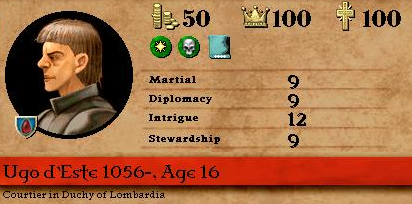
Since Ugo has turned out to be a pretty solid all-around character and is strong in Intrigue, I decide to use his bachelorhood to fill a Diplomacy hole and start going bridal shopping. I quickly find a 17-year-old Grey Eminence in the County of Bescanon, the daughter of the count, and within a matter of days my proposal is accepted and Gisele de Macon becomes my new chancellor.
In March, Parma receives Brickwork Structures, the natural flow of technology continuing to bumble along, and by June, I'm down to "Slightly Tarnished" reputation. Of course, I still have a ways to go.
In July, Duke Azzo comes down with a sniffle at the age of 65. It probably won't be long now, so I decide to use his remaining prestige to usurp the title of Doge of Genoa before the finally croaks. Meanwhile, I use my latest income to start a Court of Justice in Pavia.
On September 18, I finally discover Stonepit in Lombardia. I switch my economic research over to Power to get access to Road Networks (although in retrospect I probably should have stayed in Mining to research Charcoal and start building Mines). Parma celebrates by completing its forestry a couple of months later, and in December I have enough to start a Tile Factory in Lombardia.
The year closes out with a laughable "Courtier thinks he can make a better X" event. Ennio Papareschi thinks that his 10 DIP is somehow greater than Gisele's 13 DIP. I disagree, but I don't exile him -- he has positive loyalty growth and 10 Intrigue, so I may as well keep him hanging around just in case.
By April 1073, Azzo d'Este is still alive, a sickly 66-year-old man. And then a miracle worker comes by and offers to heal him. I decide to take the opportunity to check on his successor, Fulco.
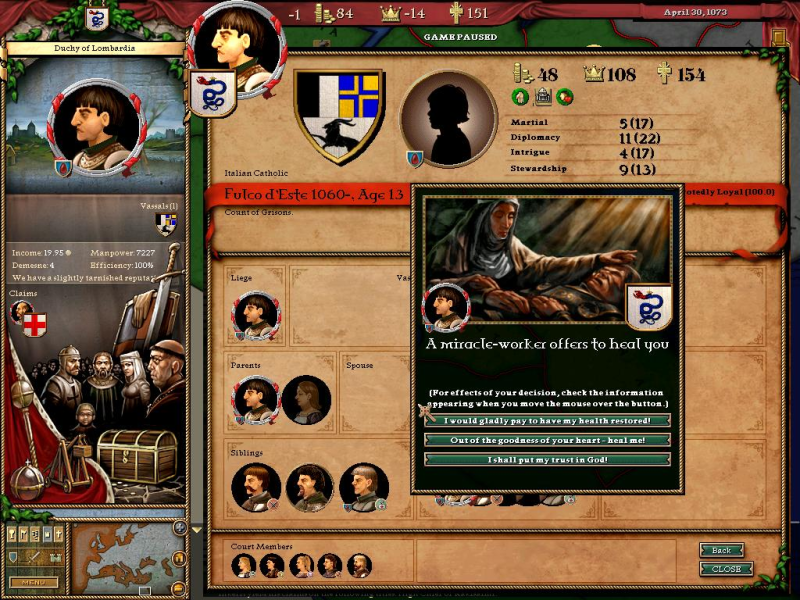
Fulco ain't looking so good. That 4 Intrigue is particularly brutal, and I can't allow that to inherit. Unfortunately, that means I need a little more time to rearrange the inheritance, so I drop the coin to pay the healer, and Azzo is returned to health.
As you can see, Fulco's attributes of 5/11/4/9 are quite inferior to Ugo's 9/9/12/9, so I need to switch things around to make sure Ugo inherits. I start by revoking Fulco's title as Count of Grisons, and on May 15 he agrees (as well he should -- he's an honest, amiable, 13-year-old). I immediately make Ugo the new Count of Grisons, and thus a new heir is designated. So much for Ugo being the non-inheriting son, but fortunately my attitude towards him up until now didn't cause him to turn out rotten, so all is good. With Ugo out of Azzo's court, I return to my former 11 Intrigue spymaster, so there's no great loss there.
Due to revoking Fulco's title, however, I've pushed myself back over the threshold to a Tarnished reputation. Unfortunate, but necessary to ensure a good inheritance -- one of the most important things in the game. I could have simply changed to a primogeniture law (I couldn't have changed to Consanguinity, as Fulco with his count title still outranked Ugo), but I don't like the primogeniture laws and the possibility of a boneheaded eldest son, on top of which I wanted Ugo to get a little hands-on experience with rule before he inherits.
My inheritance juggle comes not a moment too soon. On August 25, Duke Azzo d'Este finally dies.
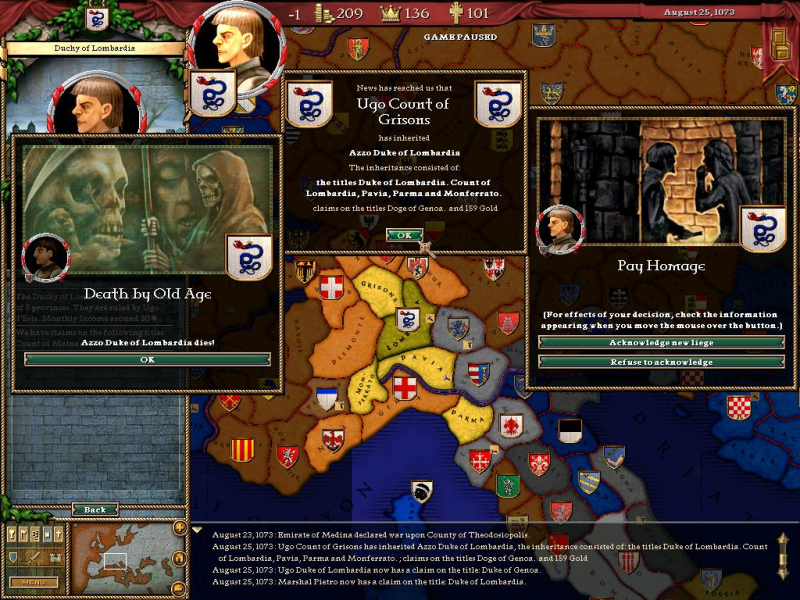
I have no idea who Ugo is supposed to be paying homage to, though.
The same month, Heinrich creates the title of King of Burgundy. But not of Italy. Because he can't.
With the combined money of Azzo's estate and Ugo's treasury, I start a Fishing Wharf in Parma and a Forestry in Grisons. Ugo also brings a new team of courtiers with him to court, so the duchy gets a new spymaster (skill 13), its first diocese bishop (I still don't know exactly what these guys even do, aside from act as tutors for children with ecclesiastical educations), and a new, finally-competent (skill 12) marshal, who proceeds to die a week later. My reputations comes back down to Slightly Tarnished, but I have plenty of time to let it recede some more -- Genoa, my primary target, is still loyal to Germany, and Doge Manfredo Giustiniano is a Loyalist, so that won't be changing anytime soon.
Speaking of loyalists, Alexios Komnenos no longer has realm duress, but Byzantium has suffered an independent Achaea, Preslav, Tyrnovo, Thracesia, Archipelago, Charsianon, Trebizond, Armenia Minor, and Mesopotamia. The only former principality that Byzantium is still at war with is Cherson. Still, kudos to Alexios for getting things to quiet down, and most of those independent princes aren't any great loss to him.
1074 kicks off with Soft Leather spreading to Grisons, but it still hasn't reached Lombardia, so I keep plugging away. In March, Divine Rights spreads to Lombardia, which I always enjoy.
In May, Lombardia completes its Tile Factory and I start on a Royal Post -- especially useful for any random events that might injure the loyalty of the nobility, since Popular Law prevents you from reducing Crown Duty below 50% (making the nobles the most difficult class to improve loyalty). In June, the Doge of Pisa offers an alliance. I don't really have anything else going right now, so I accept.
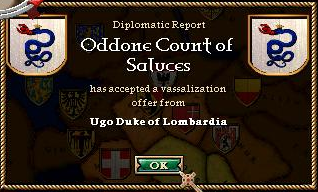
A few days later, the Count of Saluces accepts one of my vassalization offers! Whee. Saluces doesn't count towards forming Italy, but a new vassal is a victory nonetheless. Of course, that means that Oddone di Montferrato, the Count of Saluces, is now my heir under Elective Law. That won't fly, so just to be safe, I decide it's time to switch to Salic Consanguinity (it was going to happen sooner or later, so it might as well happen when I only have one vassal to piss off). This change makes the infant Lanfranco d'Este, Ugo's son, the heir-designate.
Salic Consanguinity is my favorite inheritance law -- you don't have to worry about some son of a sister inheriting and ending your game, but you have a great amount of control over just which member of your bloodline does inherit. Eldest son is a bum? Doesn't matter, because he won't be inheriting. Of course, this switch gives basically all of my male courtiers, along with Count Oddone, claims on my titles, but I'll shake that off. Meanwhile, a Royal Post gets started in Pavia, and a month later, Parma finishes its wharf and Pavia receives the Shortbow tech (snooze).
In October, Aristotelian Logic spreads to Parma, which is great, but I'm still looking to get this in Lombardia. I end the year with the groundbreaking of a training grounds in Parma and the spread of Basilican Structures to Pavia (which can now finally build a church).
1075 is a slow year for Lombardy. A few technology spreads -- Three-Field System to Pavia, Divine Rights to Grisons, Divine Duty to Lombardia and Parma, and Handaxe to Pavia -- and a few construction notices -- Parma finishes its training grounds and starts on a sawmill (another +gold%, -build time building) -- but little else. Ugo gets that great "Love My Wife" event, and since his wife is the ducal chancellor, a friendship is a good thing.
In August, Swabia declares war on Germany. I cross my fingers and hope that this is the harbinger of Germany's imminent collapse, although Heinrich unfortunately doesn't have Realm Duress. I also get the "Friend of an Enemy is My Enemy" event -- the count of Chalons is a friend of my rival, the count of Bescanon (the brother of Ugo's wife), and since Chalons isn't really relevant to me and I don't want to gain either Romantic or Vengeful, I just take the new rival.
The year ends on a sour note that sends the court running for its chamber pots:
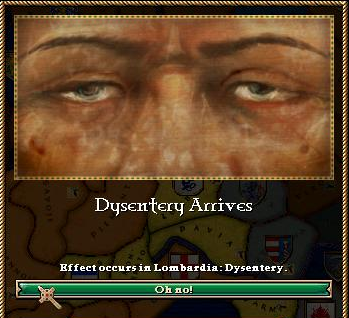
In January 1076, Fulco is now old enough to marry. I would like to get a good steward, as my current one is very slowly losing loyalty (-0.1%/month), but again, I wait for him to finish his education.
In February, due to my inheritance change (I think), I finally realize that the clergy and nobility in my demesne are at 80% loyalty. I can't reduce Crown Duty below 50%, but I can increased Church Donations. I crank them up to 100% (+1.00% loyalty / month), which raises my donation quota from 1.7 to 3.3 gold. I still have a total income of 21.5, so I'll be fine.
The same month, I get the "How to Raise Lanfranco" event. I naturally go with Parental Upbringing, so that I can try to shape him into a good heir. I lose 51 gold, which is a shame, but I still have 57 in the treasury and nothing pressing to build, so it's not an immediate worry.
Fulco finishes his education in April, becoming a Crafty Merchant.
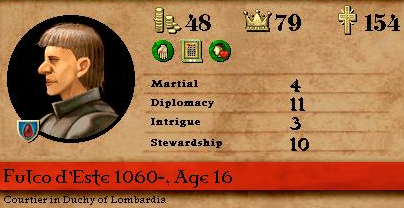
That switch to Ugo as heir is looking even better now. Fulco isn't great, but he's bearable. I hit the market to try to find a high-stewardship wife, but unfortunately there isn't a lot out there. I end up just going with the best thing I can find, and Fulco ends up marrying Bourgondie de Nevers, a 16-year-old courtier in Ancona, who isn't a good steward (8 ST) but has decent Diplomacy (11).
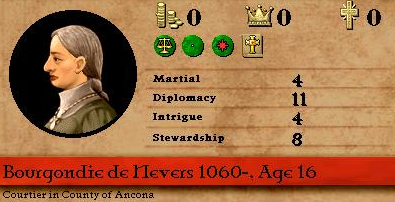
Meanwhile, Offensive Terrain spreads to Parma (I don't really know how to feel about the Offensive and Defensive Terrain techs --- as far as I can tell, they are identical, and I don't have any idea how significant a +1 shock or +1 morale is), and Pavia completes its Royal Post.
Swabia faceplants in its attempt at rebellion and gets completely annexed by Heinrich. The German King is rocking, and with all his claims, I just hope he doesn't come knocking on Lombardy.
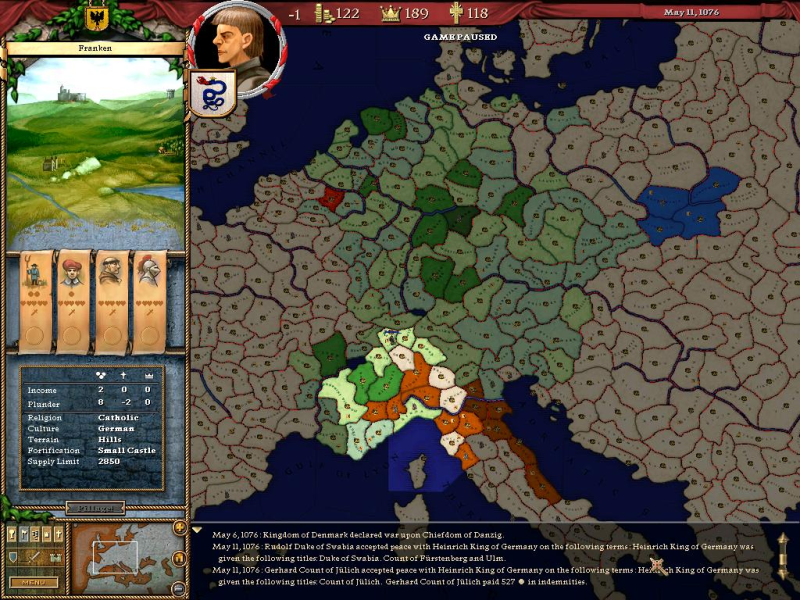
In May, I get an event about stealing enemy holy relics. I can take 377.25 gold with a 25% chance of becoming Arbitrary, or I can take nothing with a 10% chance of becoming Just. 25% is pretty low, so I take the gold. And become Arbitrary. Bah. In any case, I decide to use the money from the relics to finance an extensive road network in Pavia.
In June, Divine Rights makes it to Pavia, and I decide that since Grisons is basically worthless, I can grant it back to Fulco in order to reduce my reputation a wee bit. I still have Lombardia, Pavia, Parma, and Montferrato in my demesne, and I still have a Slightly Tarnished reputation, but it should be a bit closer to Respectable by now.
In September, after the Shortbow reaches Lombardia, I get another event:
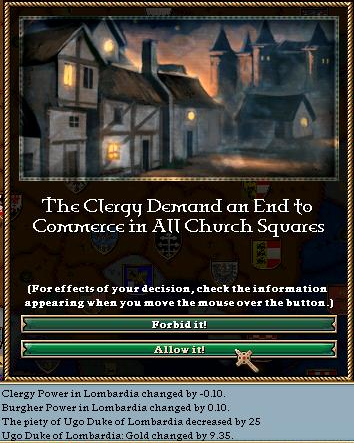
I go with the one that increases Burgher power for the slight income boost.
1076 concludes with Soft Leather spreading to Lombardia, so I switch over to Castles in an effort to get Small Castle. (For those of you making the case for Siege Weapons from the earlier post, don't worry -- this was already played at that point, and I'll be factoring that in for the next round).
1077, and I am at last down to Respectable reputation. I want to get enough prestige to grab the Magistracy of Genoa, but I'm 105 short (198 vs. 303), so there's still lots of time to wait. Parma finishes a sawmill in April, and in July, it starts a Court of Justice. The quiet year ends with Goatherding spreading to Pavia.
1078 gets a little more action. In January, my clergy are back at 100% loyalty, so Church Donations gets dropped back down to 50% and I get back 1.4 gold per month. In February, I have to decide how to raise Ugo's second son, Goffredo. I go with Parental Upbringing (and lose 46 gold), on the grounds that if Lanfranco doesn't work out, I'll have a backup. Both Goffredo and Lanfranco were lucky enough to get the +1 to all attributes bonus on the first birthday, so hopefully that bodes well for their future.
In March, I receive the lamest courtier-challenge ever.
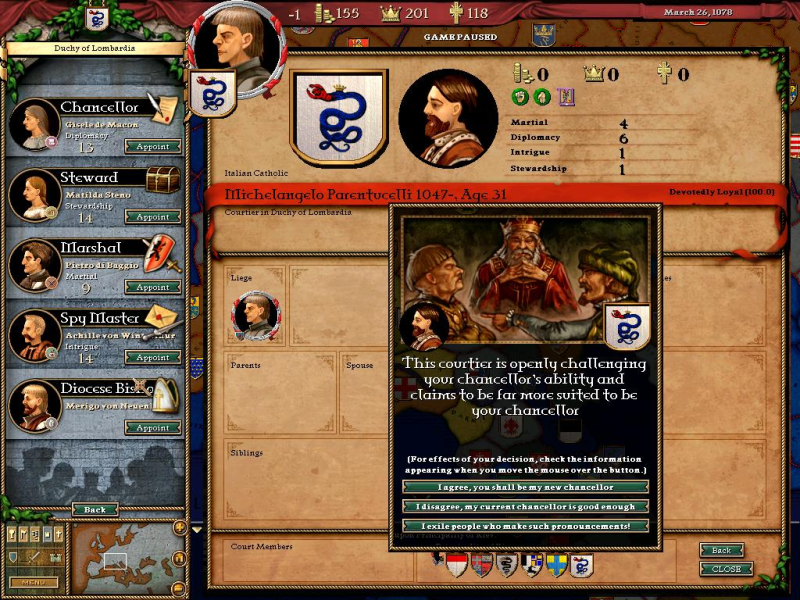
Diplomacy 6, or Diplomacy 13? Hmm.
I throw him out of the court. I'm also hoping that his replacement will be a good steward, since that problem is still lurking, but get no luck. Matilda Steno, Azzo's final wife, is still the steward and is quite good at it, but her loyalty is at 68.6 and is falling by 0.9% per month. Unfortunately, the best replacement for her has Stewardship 6. Ouch.
Come May, I get an "Enemy of an Enemy is my Friend" event. Managing on my own gives a 25% chance of Stubborn, which I don't want (because of the Intrigue penalty it carries), and there's not much point in Proud, so I just take a pointless friend in the form of the Prince-Bishop of Mainz.
Later that month, Lanfranco is afraid of the dark. I end up deciding to ridicule him -- I'm trying to gain him a +Intrigue trait, and technically I succeed, as he becomes a Coward (+ Intrigue, - Martial). It was only a 20% chance, though, so I still feel I made a decent decision even if it could have turned out better.
In June, Montferrato finishes a sawmill and starts on a road network, but the month's news is dominated by my ally, Pisa, coming under attack by its wayward vassal, the Prince-Bishopric of Piombino. I honor the alliance and declare war. The way I figure it, Pisa doesn't need my help -- they have an almost 2:1 advantage by themselves -- but I'm a good guy. I'm also a guy who's hoping that I can squeeze some tribute out of Piombino before they go under with no investment on my part. Much as I would like to vassalize them, there's no way I'll make it down there before Pisa initiates the siege, which they do in August.
Piombino consistently rejects my peace offers and tribute demands. Meanwhile, a pair of back-to-back events regarding the same person -- a Friend of an Enemy and an Enemy of a Friend (it turns out that the Count of Bescanon, my rival, is friends with a rival of the Count of Bourgogne, one of my friends) nets me a new rival in the Count of Bourgogne. I choose the "Indeed it is" event for both -- the first time, I don't want Romantic (penalties to Intrigue and Stewardship) or Vengeful (penalty to Piety, which I'm trying to keep in good shape for my reputation), but the 25% chance of not getting a rival wins through; the second time, I don't want Selfish or Lazy, and the 75% chance wins.
Towards the end of October, it's time to choose a formal education for the now-age-five Lanfranco. The kid is shaping up fairly well so far:
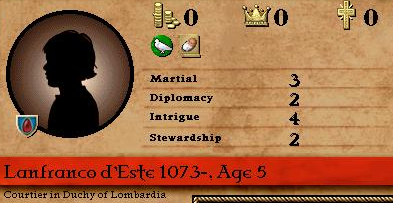
I decide to give him a Court Education, since he's looking pretty good for Intrigue and the Court tends to produce fairly good results (when you get one of the better tiers).
I finish a court of justice in Parma in November, where I'm saving up for extensive roads (and need 168 more gold). I decide to build a Royal Post while I wait, since by the time it's done I'll have the money to start the better roads.
1079 kicks off with a painful lesson in why "blank wars" are not a good idea:
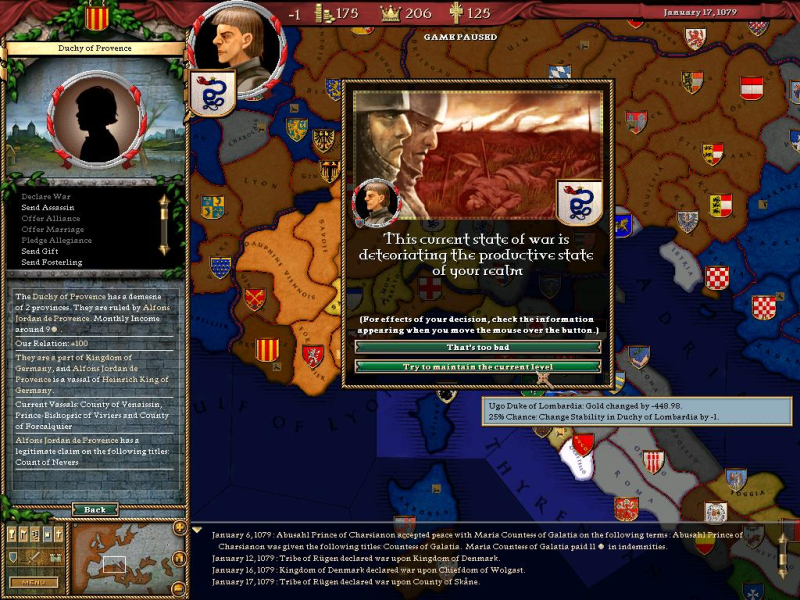
I don't want to lose 450 gold, especially when there's a 25% chance it will be for nothing, so I just take the stability hit, again, bringing me to -2 Stability.
In keeping with the "bad news just barely slipped in before the deadline" trend set by my stability hit during the annexation of Parma, two weeks after this one Pisa annexes Piombino and ends the war.
Meanwhile, Goffredo gets curious about the origin of babies. Suspicious (a possibility for a couple of the options) is a big Diplomacy hit, so I tell a two-year-old about birds and bees and babies. Goffredo promptly becomes deceitful (I don't really know how this relates to the sex talk, but hey, there that is), which is still -1 Diplomacy, but with +1 Intrigue it's not a total loss.
Lombardia manages to discover Small Castle in March, so I switch back to Chain Armour to try for Light Chain. Later in the month, I have to raise Adalberta, Ugo's daughter. Since I don't need to "groom" her as much, I just hand her off to the nannies without realizing that that +1 Stewardship will come to naught.
Pavia finishes its extensive roads in May, and I have nothing else left to build there. For some reason I still can't build a church, even though I'm sure that the province has both Brickwork and Basilican Structures. In October, Montferrato finishes some roads of its own (of the regular variety), so I start a Training Ground. Meanwhile, Genoa annexes a rebellious Prince-Bishopric of Nice. Stupid Genoans.
The decade, and this batch of posting, ends when the King of Norway becomes the Papal Controller in November, after the Duke of Capua finally dies. Robert Guiscard no doubt throws a raucous party to celebrate.
The Duchy of Lombardy of Ugo d'Este, c. December 31, 1079
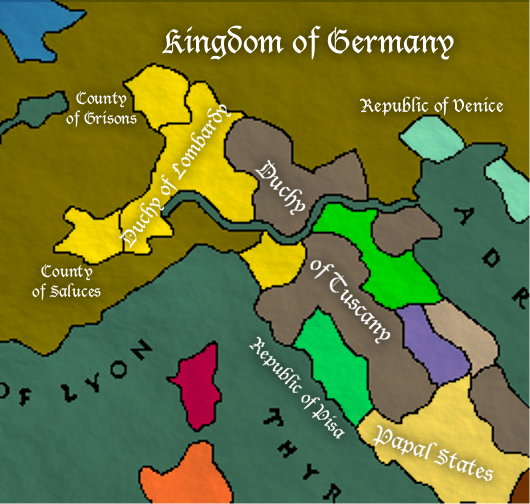
The Known World, c. December 31, 1079
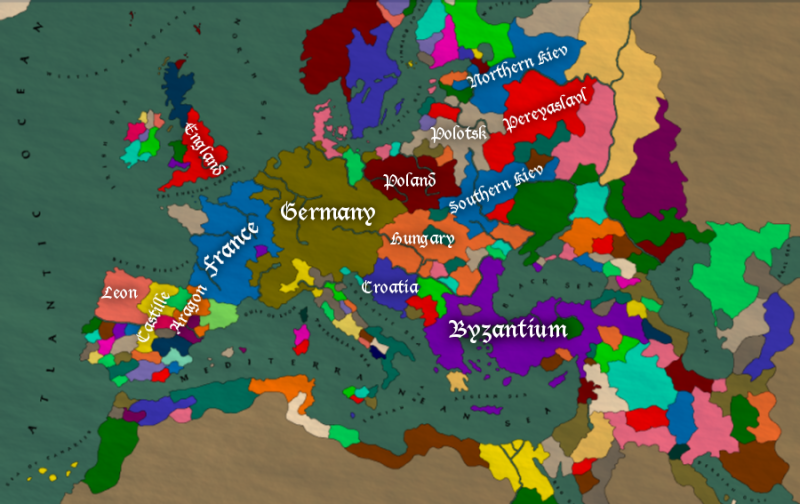

The Known World, c. December 31, 1079

General Musings
-- It's good to see some of the AI factions that I rarely see succeed doing strong. Alexios Komnenos has prevented the Byzantine Empire from losing too much to rebellion, and the Russian principalities (save Novgorod, which is gone) are really growing well. Polotsk might even manage to form Lithuania with a few more territories. Meanwhile, nothing much is going on in Iberia. None of the Muslim factions are blobbing, but there's not much progress on the Christian side, either. Castille and Aragon have managed to grab a couple of provinces, and Barcelona is still alive, but the most noteworthy development there was when a minor county in Aquitaine inherited the Kingdom of Aragon.
-- Germany, on the other hand, isn't budging, and probably won't until Heinrich's death at the earliest. In my Mazovian game, it took a couple of generations before Germany came spectacularly unglued, so I could be waiting for a while. Until then, I won't be able to make much headway in Italy unless I want to go up against Tuscany, and I don't have any claims there anyway.
-- Speaking of claims, Ugo only has two of them. One is the worthless claim on the County of Maine that he starts the game with, but I have no interest in a county in northern France. The other is on the Doge of Genoa, which Azzo grabbed before he finally gave out. I'd obviously love to start getting some claims on any non-Henrician Italian states, but I haven't been fortunate enough on that front. This is one of the advantages of playing somebody near a bunch of heathens -- you don't need silly things like "reasons" in order to take their land. I might have switch to Feudal Contract (or Royal Prerogative) in order to fabricate some claims, but I'm reluctant to give over my taxation control over the lower classes and don't know how big an impact the change in army composition would have. That discussion, as you see, is already underway.
-- Aristotelian Logic still hasn't popped for Lombardia. I'm thinking about taking my focus off Thought and putting it into Schools. Input?
Yeah, Gratianus (?) has a calculator over on the CK board to figure out what the exact numbers are, based on those factors.@I just did some more research and found that the numbers also vary according to the terrain of the province
Definitely the free moneylenders event. If you also have church supremacy, you can later shut them down for free piety.@And while we're on the subject of laws, what exactly are "Usury Events" that accompany Regal Supremacy in the religious laws?
Maybe also affects the 'We can borrow some cash' events, but I'm not sure about that.
No!@I finally discover Stonepit in Lombardia. I switch my economic research over to Power
Yes! (unless cultural conversion is an issue for your realm atm or one of your neighbors already has charcoal and it'll spread quickly in any case.)@(although in retrospect I probably should have stayed in Mining to research Charcoal and start building Mines).
Supposedly, their piety is added to yours for various events (although it doesn't seem to affect the PC race). More importantly, they help to combat heresy and infidels within your realm, but that'll be more important if you ever go on crusade. Skeptical, heretic, and excomm. bishops are (hopefully obviously) bad; wise and energetic ones with good educations are great; zealous bishops are a wash (they tend to kill off excellent courtiers and pick fights you don't need).@diocese bishop (I still don't know exactly what these guys even do, aside from act as tutors for children with ecclesiastical educations)
They're most useful for creating bishoprics, though.
Well, it certainly doesn't help that he has personal demesne bordering yours. Not that you were able to avoid it or can fix it now, mind, but it's still not good. If he DOWs, immediately spend or give away all of your money except 4 or 5• and then offer it to him in a peace deal before your first battle. If the month clicks over and you get more income, spend it or give it away again. What you're aiming for is to give him all of (not much of) your treasury. The AI usually thinks this is great.@The German King is rocking, and with all his claims, I just hope he doesn't come knocking on Lombardy.
You're already making plenty of money. The 50 piety (+25 v -25) was probably more valuable, since you have a young ruler who will eventually be in contention for PC. With events like that, take the piety or prestige, then just reset the power levels back yourself.@I go with the one that increases Burgher power for the slight income boost.
Meanie.@I end up deciding to ridicule him
You didn't pause the game as soon as the siege ended and Pisa's flag went up over Piombino? That's when they would've given you their cash (although it's even odds whether Pisa annexes them before they reply).@two weeks after this one Pisa annexes Piombino and ends the war.
Absolutely. Not because logic isn't popping for you (sometimes it takes awhile), but because you've got some kids in line and the school will give them better educational outcomes. In fact, if you get to 15 or so without having discovered it, you might want to consider fostering them someplace with strong advisors (see above) and a school. (Or is there an age cut-off for fostering? I just didn't want the money you spent on parental upbringing to go to waste.)@I'm thinking about taking my focus off Thought and putting it into Schools.
Last edited:

